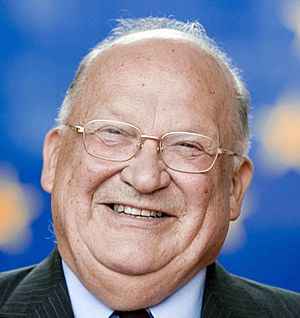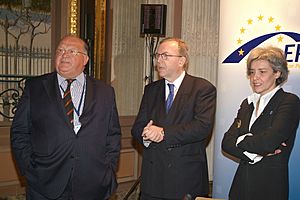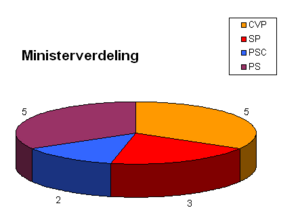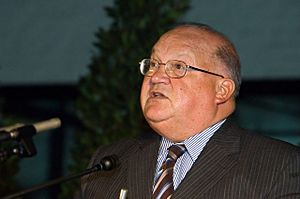Jean-Luc Dehaene facts for kids
Quick facts for kids
Jean-Luc Dehaene
|
|
|---|---|
 |
|
| Prime Minister of Belgium | |
| In office 7 March 1992 – 12 July 1999 |
|
| Monarch | Baudouin Albert II |
| Preceded by | Wilfried Martens |
| Succeeded by | Guy Verhofstadt |
| Personal details | |
| Born |
Jean Luc Joseph Marie Dehaene
7 August 1940 Montpellier, France |
| Died | 15 May 2014 (aged 73) Quimper, France |
| Political party | Christian Democratic and Flemish (CD&V) |
| Spouse | Celie Verbeke |
| Children | 4 |
| Signature | |
| Top - 0-9 A B C D E F G H I J K L M N O P Q R S T U V W X Y Z |
Jean-Luc Dehaene (Dutch: [ʒɑ̃ːˈlyk dəˈɦaːnə] (![]() listen); born August 7, 1940 – died May 15, 2014) was an important Belgian politician. He served as the prime minister of Belgium from 1992 to 1999. People often called him "The Plumber" or "The Minesweeper." This was because he was very good at solving tough political problems.
listen); born August 7, 1940 – died May 15, 2014) was an important Belgian politician. He served as the prime minister of Belgium from 1992 to 1999. People often called him "The Plumber" or "The Minesweeper." This was because he was very good at solving tough political problems.
Dehaene was a member of the Christen-Democratisch en Vlaams (CD&V) party. He first became a government minister in 1981. His time as prime minister saw big changes for Belgium. He also helped manage a major bank during a financial crisis. He was the last prime minister to serve under King Baudouin.
Early Life and Start in Politics
Jean-Luc Dehaene was born on August 7, 1940, in Montpellier, France. His parents were escaping from the German army at the time. He studied at the Université de Namur and the Katholieke Universiteit Leuven. During his studies, he was part of the Olivaint Conference of Belgium.
He began his political journey through a trade union. This union was called the Algemeen Christelijk Werknemersverbond (General Christian Workers' Union; ACW). It was closely connected to the Christelijke Volkspartij (Christian People's Party; CVP).
Dehaene's wife, Celie Verbeke, was from Illinois in the United States. Her grandparents were Belgian immigrants. She spoke Dutch without an accent. Because of this, most Belgians did not know she had American roots for a long time.
Dehaene loved football and supported Club Brugge K.V.. He believed football was a key part of Belgium's national identity. In 1981, he became the Minister of Social Affairs. He held this role until 1988. Then, he became Deputy Prime Minister.
Jean-Luc Dehaene as Prime Minister
Dehaene I Government (1992–1995)
In 1992, Jean-Luc Dehaene successfully formed a new government. This happened after two other politicians, Guy Verhofstadt and Melchior Wathelet, could not. His government included both Christian Democrats and Social Democrats. This period was very important for Belgium. In 1993, his government successfully changed Belgium into a federal state. This meant power was shared between the central government and different regions.
In March 1993, Dehaene offered to resign. This was because of disagreements about how to manage the country's money. However, the issues were resolved quickly, and he continued as prime minister.
After King Baudouin passed away on July 31, 1993, Dehaene's government took over the royal duties. They did this until Prince Albert became King Albert II nine days later.
In 1994, Dehaene ordered Belgian troops to leave Rwanda. This decision followed the killing of several Belgian peacekeepers. He was considered a top choice to become the President of the European Commission. However, the British Prime Minister, John Major, did not agree to his appointment. Instead, Jacques Santer from Luxembourg was chosen.
Dehaene II Government (1995–1999)
Dehaene's second government also included Christian Democrats and Social Democrats. This government faced several political challenges and scandals. One of the most well-known was the Dutroux affair. Despite these difficulties, the government completed its full term.
In 1996, Dehaene received the Vision for Europe Award. This award recognized his efforts toward a more united Europe. Dehaene also played a key role in Belgium joining the Euro. To prepare for the Eurozone, his government made some tough economic changes. These changes were not always popular with the public.
Just before the 1999 elections, a food safety scandal known as the Dioxin Affair happened. This event caused both major parties to lose a lot of public support. As a result, Dehaene's government fell. A new government, led by the Flemish liberal Guy Verhofstadt, took over.
Life After Being Prime Minister
Later Political Roles
From 2000 to 2007, Jean-Luc Dehaene served as the mayor of Vilvoorde. His party, the CD&V, asked him to run in the 2003 elections again. However, he was not aiming to be prime minister this time.
In June 2004 and again in June 2009, Dehaene was elected to the European Parliament. He represented the CD&V party as part of the European People's Party (EPP) group. In 2003, he was given the Vlerick Award.
UEFA Financial Fair Play

Dehaene also played a role in football. He was the chief enforcer for the UEFA's Financial Fair Play (FFP) rules. These rules help make sure football clubs manage their money responsibly.
Dexia Bank
In October 2008, Dehaene became the chairman of Dexia Bank. This was a Belgian-French bank. The bank was facing serious problems during the financial crisis. Dehaene was asked to guide the company through this difficult time. His strong political connections helped Dexia get financial support from the Belgian government. In 2012, Dexia Belgium changed its name to Belfius.
Death
Jean-Luc Dehaene passed away on May 15, 2014. He had a fall while on holiday in Quimper, France. Earlier that year, he had been diagnosed with a serious illness. Because of his health, he was not planning to run for reelection as an MEP. He was 73 years old when he died.
After his death, many leaders shared their respect for him. The Belgian Prime Minister, Elio Di Rupo, called him an "exceptional statesman." Tributes also came from Guy Verhofstadt, Martin Schulz (President of the European Parliament), and José Manuel Barroso (President of the European Commission).
His body was available for public viewing in Vilvoorde's town hall. Retired King Albert II and the Flemish Minister-President Kris Peeters visited to pay their respects.
Honours and Awards
 Belgium: Minister of State, a special title given by the King.
Belgium: Minister of State, a special title given by the King. Belgium: Grand Cross of the Order of the Crown.
Belgium: Grand Cross of the Order of the Crown. Germany: Grand Cross in the Order of Merit of the Federal Republic of Germany.
Germany: Grand Cross in the Order of Merit of the Federal Republic of Germany. Uruguay: Medal of the Oriental Republic of Uruguay.
Uruguay: Medal of the Oriental Republic of Uruguay.
See also
 In Spanish: Jean Luc Dehaene para niños
In Spanish: Jean Luc Dehaene para niños
 | Selma Burke |
 | Pauline Powell Burns |
 | Frederick J. Brown |
 | Robert Blackburn |



